Sorry Irene Dunne fans, but Symphony of Six Million is a Ricardo Cortez movie. Cortez plays Dr. Felix Klauber, a man obsessed with helping sick people since he was a young boy, and Dunne is Jessica, the handicapped girl who’s loved him her whole life.
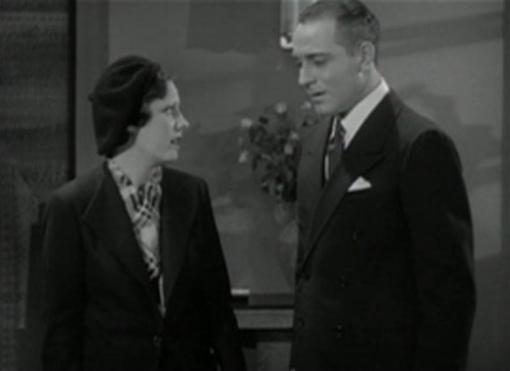
Irene Dunne and Ricardo Cortez
We first meet the two as children on the front stoop of their apartment building in a section of New York so crowded it seems they’ve crammed the entire six million of the title onto the block. When Felix turns down his brother’s request to umpire their baseball game in order to keep Jessica company his brother and the other boys tease him by chanting “Felix loves a cripple” among other things, angering the young surgeon to be.
The opening section of Symphony of Six Million is crowded with child actors and dominated by the pair of adults playing Felix’s parents, Anna Appel as Hannah Klauber and Gregory Ratoff in his American screen debut as her husband, Meyer, to the best of my detective skills, a dry cleaner by trade.
The Klauber family is Jewish and while hearing Papa cry, “Oy, oy, oy,” in escalating volume after eating too much herring may make you do the same, the family at the center of Symphony of Six Million go far beyond screen stereotypes of the period and largely succeed in Associate Producer Pan Berman’s goal of avoiding “the usual conception of Jewish characters” (AFI 2118), at that time not very positive. The movie even includes a highly touted scene featuring a ceremony called the Redemption of the First Born which was pointed out by Variety as one of few film scenes to include a Reform rabbi.

The family attends to Papa (Gregory Ratoff) after too much herring
The Klauber apartment is crowded with furniture we’ll see age alongside the characters, but it’s spacious and made a good home by the loving family. Symphony of Six Million, beyond being a medical drama, is a story of family and roots, of rising from meager beginnings but never forgetting to give back.
We meet Ratoff’s Papa when he arrives home from work and is surrounded by his three children with warm greetings. Little Birdie, the only daughter, clamors for a gift. It’s Papa’s birthday and he has indeed brought a gift for each of the children. For Birdie it’s sheet music by Rubinstein, who little Magnus (Sidney Miller) remarks is a tailor in the neighborhood. “A different Rubinstein,” Papa assures them. Young Magnus is teased before being given a baseball, but the real preview of his adult character comes out at the dinner table a little later when he explains to the family the benefits of opening a hot dog stand. He’s a born businessman. Young Felix’s (Lester Lee) gift is a big pair of white cotton gloves, meant to protect the hands of the future doctor.

Felix (Lester Lee) is on his way!
It’s at dinner that evening when Papa overdoes it on the herring and is put down by an attack of indigestion which is, of course, assumed to be a much worse ailment. Felix saves the day when he has his mother fix a bicarbonate, a remedy confirmed as correct by a doctor passing through their building on a house-call. We get a close-up of young Felix beaming over having made the correct diagnosis before the camera allows a decade or two to roll by and everybody ages into gray hair or adult actors.
With another twenty years put on them Appel and Ratoff continue to shine throughout Symphony of Six Million. Irene Dunne appears distracted by her character’s handicap, a pronounced limp and an immobile right arm that she keeps clamped tightly to her body throughout the movie. She doesn’t exactly have a lot to do in Symphony of Six Million and she’s often as stiff as her character looks when she does.
The star of the film, Ricardo Cortez, formerly Jacob Krantz, a native New Yorker of Austrian Jewish heritage himself, had come to the screen a decade before as a high-quality Valentino knock-off. In Symphony Cortez is, no surprise, masterful in the scenes calling for no dialogue. He’s extremely proficient at his screen doctoring, smiles and optimism with young children and later delivering serious prognoses for neurotic wealthy women while managing to roll his eyes at them behind their backs. Put a mask on him and hand him some surgical tools and Cortez is a maestro, waving his arms emphatically and believably with the instruments gripped in his Millon Dollar hands.

Ricardo Cortez in action as Dr. Felix Klauber
It’s when Cortez opens his mouth that the quality drops some. In scenes with Klauber family members he typically wears a jack-o-lantern grin and sports the tone of someone talking to a very young child. Take all dialogue away and he can give us a pretty good bout of intensity, even worry or depression, but once he starts talking you’re often left hoping Appel or Ratoff soon interrupt.
In Symphony of Six Million Ricardo Cortez’s Dr. Felix Klauber soon attains his dream of becoming a doctor in the very ghetto where he was raised applying his trade at the Cherry Street Clinic. Nearby Irene Dunne’s Jessica also works for the public good at the Braille Institute for the Blind where she supervises a room of young children whose days are made with each visit of the friendly Dr. Klauber and his pockets full of candy.
As time passes and Felix continues to see patients in the bedroom he’s lived in since he was a boy, business minded Magnus (Noel Madison) begins whispering in his parents’ ears. Whispering is probably a bit soft for Magnus. He’s appalled at Felix’s wasting his career on their poor neighbors, opining that Felix “doesn’t understand medicine is a business.” Magnus appeals to his mother by using Birdie as an excuse, claiming his little sister will never meet a worthwhile man in their lousy neighborhood, finally convincing Mama to have a talk with Felix.
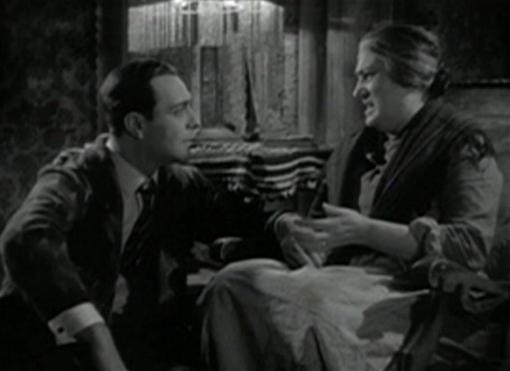
Ricardo Cortez and Anna Appel
Felix is heartbroken. He’d been so obsessed with giving back to the ghetto and serving his fellow man in general that he did actually overlook how his family might feel about their lack of upward movement. While Felix may have missed the possibility of doing more for his family, the oversight was for the good of others, and you feel for him when he has to listen to his mother beg him for a better life. This is very well done by Anna Appel as it’s made clear the idea had never really occurred to Mama Klauber until son Magnus put it into her head. It’s also pretty clear that Mama pushes for the sake not only of the family as a whole, but Felix’s own betterment as well.
Felix moves his practice, first to West End Avenue, before taking it up another notch to Park Avenue. It’s a bit heartbreaking to see Felix offering to shake the paw of one of his patients’ Pekinese, the dog which became the sure sign of upper crust snobbery when used as an accessory in 1930’s films. Park Avenue is a long way from the old Cherry Street Clinic, which still receives cash donations from Felix, now too busy to visit in person despite his best intentions.
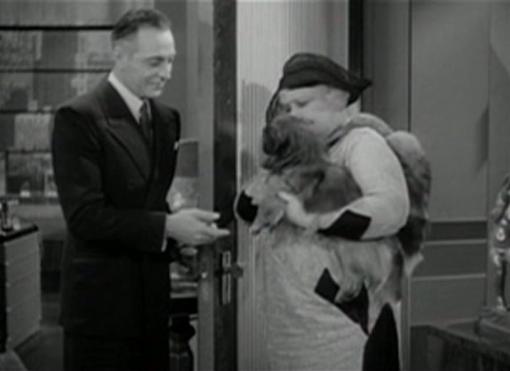
Shake, Ricardo, shake
Symphony of Six Million differs from most rags to riches stories in that while Felix is distracted by becoming wildly successful, there’s no doubt his heart is still in the ghetto.
He’s climbed far, and yes, he is proud that Vanity Fair has published a full page close-up photo of his Million Dollar Hands, but at the same time he scoffs at his patients, mostly middle aged women who simply wish to subject themselves to the famous hands of a handsome young doctor. At one point he tells his brother Magnus that he feels he’s taken care of the family well enough and that it’s time for him to return to their roots. Magnus nearly chokes on his Double Corona cigar at this news. While he agrees their parents are set up well he convinces Felix to stay uptown for the sake of Birdie and his own welfare.
The title of this movie is big, as is the accompanying soundtrack, but the movie isn’t so much about the six million as it is Felix Klauber’s feelings for them. This is shown especially well in two ways. At the Cherry Street Clinic when Felix is first starting out the camera climbs a winding staircase filled with people waiting to see the doctor. We return to this same overflowing staircase once Felix comes back to Cherry Street after achieving all of his success. In the first scene youthful Felix tousles a young boy’s hair and the kid is excited to have the fun-loving doctor paying attention to him. Later when a wearier Dr. Felix Klauber makes the same move the boy pulls away. He’s a stranger now.

Crowd at the Cherry St. Clinic
But the symphony may be best heard after Felix’s mother has begged him to move the family from the ghetto. Alone in his room Ricardo Cortez gives us one of his better extended silent scenes, his face becoming broken with the realization that he must leave those he’d dedicated his entire life to helping up to this point. As he drifts to his open window he listens to the wails of the six million outside. Just like that it’s all over and in the next scene his secretary is sending in a woman who quizzes him about facelifts, a procedure we can tell the young Doctor, dedicated heretofore to saving lives, finds ridiculous.
Referring to Symphony star Ricardo Cortez Hollywood columnist Wood Soanes wrote that “No one at Radio believed he was the type,” for this film, “so he rented a set, hired a crew and not only made up for the part but played a scene or two that he had adapted.” Cortez had been busy, appearing in ten films in 1931 alone, including what’s become his best known work, a strong performance in the original version of The Maltese Falcon. But it had taken awhile for Cortez to catch on in talkies after his career in the silents. According to Cortez, “It wasn’t until the New Yorkers had been imported and the studios had discovered that after all it was pictures and not plays that were being made, that we of the silents were given a hearing” (Soanes).
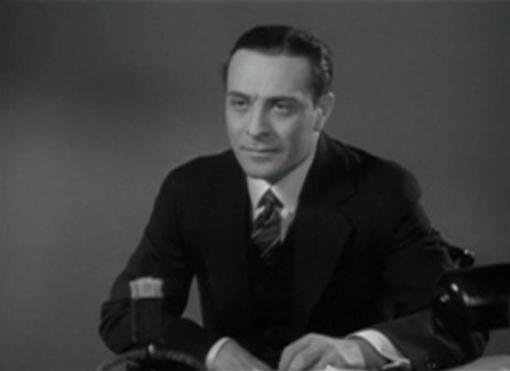
Ricardo Cortez
Symphony of Six Million was based on, as Mordaunt Hall of the New York Times put it, a “special screen story” written by Fannie Hurst, author of the oft filmed Humoresque and the later Imitation of Life. The copyright information for Symphony of Six Million notes that the Fannie Hurst story was written as an original for the screen and only later novelized by one John Adams, a pseudonym too generic to be tracked very far. Directed by Gregory La Cava the film was one of the first movies produced by David O. Selznick during his tenure at RKO Radio Pictures. Selznick was Executive Producer; the aforementioned Pandro Berman was Associate Producer.
The music, by the great Max Steiner, stands out, but perhaps too much. Period articles drew special attention to Steiner’s score, often in brief sidebar articles accompanying the standard reviews for Symphony of Six Million, pointing out that it was the “longest sustained symphony ever composed” (Moberly), playing throughout nearly every moment of the film by a sixty piece orchestra. And it is a fantastic soundtrack, but perhaps too fantastic for the film, which I don’t think played as big as RKO had expected. Despite the big title, despite the huge soundtrack, it is basically a Ricardo Cortez film, and while the subject matter is bigger than usual for the actor it, as well as his performance, is just a step above middling.

Gregory Ratoff and Anna Appel
That said, the film apparently played big in New York, where it opened April 14, 1932. According to the AFI Catalog it “played twice daily at the Gaiety theater, which charged up to $1.50 for a single ticket, and had a four-week run ‘with options.'” With it’s New York setting and largely Jewish cast and characters success in the City itself isn’t very surprising. I’d imagine Symphony of Six Million would have been more interesting to see in smaller towns across America where the less familiar setting and culture would bring a unique film experience. Still I further wonder if perhaps it would play too urban and provide too much of a culture shock for those same small towns.
The surgery scenes in Symphony of Six Million were outstanding and are some of Cortez’s best as he sports a surgical mask, waves Klauber’s celebrated hands, and says little. Their realism was the only cause of worry for the censors in this pre-Code film which likely gets lost in the shuffle some today for lack of sex or general sin. With its gallery of masked medical students and quick cuts over the participating surgeons the first of Dr. Klauber’s major operations plays with all the eeriness of a Twilight Zone episode.
In her chapter about Rudolph Valentino in Silent Stars, Jeanine Basinger spends a little time writing about Valentino’s rivals: Cortez along with Antonio Moreno and Ramon Novarro. She credits Cortez with best physically resembling Valentino and goes on to discuss his career mentioning a long and impressive list of leading ladies Cortez played in support of. Basinger concludes, “that is the difference between Cortez and Valentino: Cortez supported big-name women stars; Valentino was himself the star.” In Symphony of Six Million Ricardo Cortez has his chance to be the star. The result is at times very rewarding but better labeled uneven.
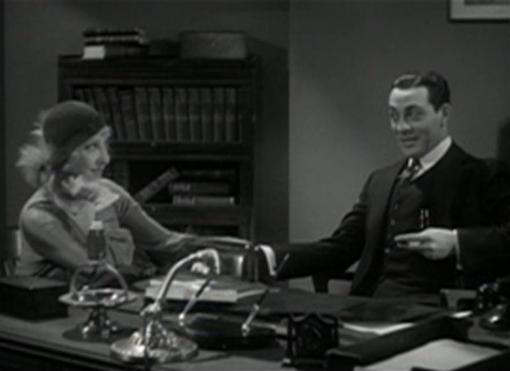
Ricardo Cortez and an uptown patient
Symphony of Six Million is a good showcase for this forgotten star. He’s good, but not as good as he needed to be. More notable is RKO’s choice to focus on a Jewish family as well as the fine surgery scenes, which come towards the end of the movie.
Watch it:
- I grabbed Symphony of Six Million off of a semi-recent TCM airing. It doesn’t seem to be a title in regular rotation, but it does air every so often. You can purchase Symphony of Six Million right now from the Warner Archives Store.
Sources:
- Basinger, Jeanine. Silent Stars. Hanover: Wesleyan University Press, 1999.
- Hall, Mordaunt. “Symphony of Six Million (1932).” New York Times. 15 Apr 1932.
- Soanes, Wood. Oakland Tribune. 2 Oct 1932: 18
- “Symphony Six Million Has Music.” Moberly Monitor-Index. 8 May 1932: 8
- “Symphony Six Million Has Music.” Chillicothe Constitution-Tribune. 7 May 1932: 2.
- The American Film Institute Catalog: Feature Films, 1931-1940, Film Entries M-Z. Los Angeles: University of California Press, 1993.

Oh yeah, Irene Dunne is actually in this movie too!


Haven’t seen this one, but it sounds fascinating. I’m familiar w/Cortez’s late-30s work, in which he often played villains (in several Mr. Moto and Charlie Chan films). His career has an interesting trajectory, from assuming a Latino identity in the 1920s, to playing roles based on his Jewish roots in the early 30s, to character roles later. Enjoyed your excellent post.
He pops up for me most often as a solid gangster, but apparently he didn’t like those roles. I think he was probably bigger in the 1920’s then I would have first guessed thinking about just how many collectibles from the period I’ve seen his face on.
Intriguing piece about a movie I now must see. I’m fond of Cortez
although I’ve never totally forgiven him (his upwardly mobile character) for the way he
treated his parents in Frank Capra’s “The Younger Generation”.
He’s the considerate son here, though at the expense of a greater general altruism. Pushed towards family over the public good.
He’s the considerate son here, though at the expense of a greater general altruism. Pushed towards family over the public good.